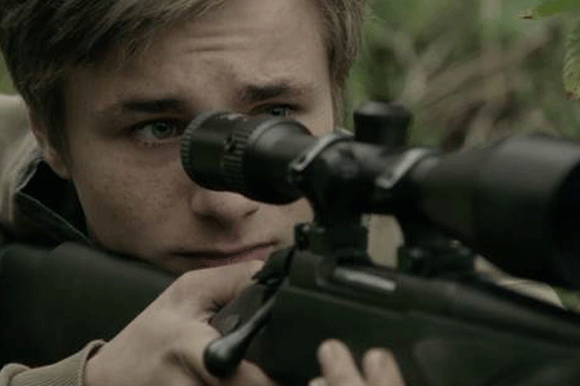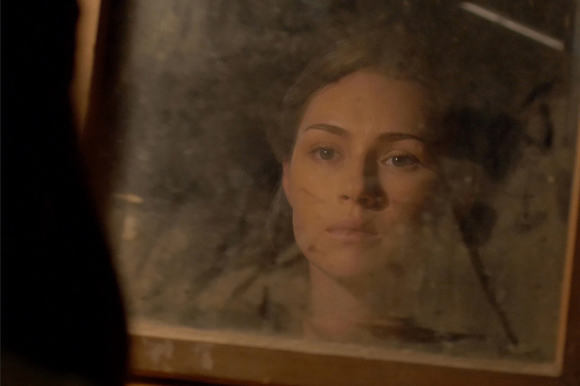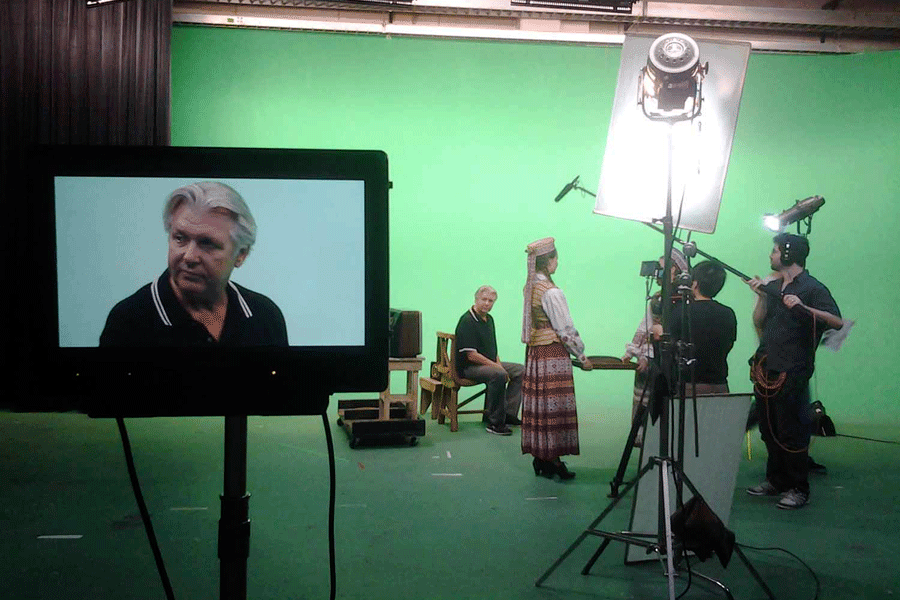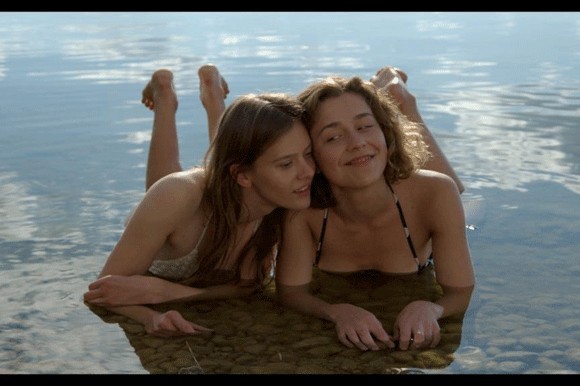The Summer of Sangaile directed by Alanté Kavaïté was selected for the Berlinale‘s Panorama 2015. The film has toured more than 50 festivals in 2015 A special programme Focus on Lithuania, with 30 features, was presented at T-Mobile New Horizons in Wrocław and a similar programme with 16 documentaries and 10 short films was screened at the 55th Krakow Film Festival. Baltic film institutions signed a mutual cooperation agreement in Cannes on 16 May 2015.
PRODUCTION
One of the most prominent Lithuanian film directors Sharunas Bartas finished his new feature film Peace to Us In Our Dreams / Ramybė mūsų sapnuose in 2015. This Lithuanian/French coproduction between Studio Kinema and KinoElektron had its world premiere at the Cannes Film Festival and won Best Director at the Batumi Film Festival and Best Cinematography at the Kinoshok festival (Russia).
One of the most productive Lithuanian film directors Algimants Puipa finished his new project The Garden of Eden / Edeno sodas in 2015. The film tells the story of a Swedish woman working at a nursing home in Lithuania and was produced by Studija 2 and the postproduction house UP Records.
 Kristijonas Vildžiunas finished shooting his fourth featurefilm Seneca’s Day / Senekos Diena in 2015. Seneca’s Day is the first coproduction between all three Baltic States, produced by Studio Uljana Kim, Amrion Production and Locomotive Productions.
Kristijonas Vildžiunas finished shooting his fourth featurefilm Seneca’s Day / Senekos Diena in 2015. Seneca’s Day is the first coproduction between all three Baltic States, produced by Studio Uljana Kim, Amrion Production and Locomotive Productions.
Director Donatas Ulvydas and producer Živilė Gallego shot the feature film Emilia, produced by Lithuania’s Fralita Films in cooperation with Ulvyds.
Deadweight directed by Ignas Miškinis and produced by Tremora along with Latvia’s Film Angels Productions was also shot in 2015.
Tragicomical drama Miracle/Stebuklas by writer/director Eglė Vertelytė went into production in 2015. The companies behind the film are Lithuania’s In Script, Bulgaria’s Geopoly, and UK’s Wostok.
Habit and Armour, a Polish/Lithuanian documentary on the Teutonic Knights directed by Paweł Pitera and produced by Arkana Studio in coproduction with Artbox, LRT, FDR, The Malbork Castle Museum, MX35, Film Factory Studio and TVN, was filmed in the historical sites of Stirniai, Siesikai, Kernavė and Trakai in 2015.
International productions were attracted to shoot in Lithuania by the tax incentives scheme launched in 2014. A six-part television series based on Leo Tolstoy‘s novel War and Peace directed by British director Tom Harper, was filmed in Vilnius in 2015. The series was produced by BBC Cymru Wales Drama in partnership with The Weinstein Company and BBC Worldwide/Lookout Point. The local partner was Baltic Film Services.
Finnish film and TV series production company Fisher King Production shot the international crime series Bordertown / Sorjonen in Lithuania in 2015. The series was created by Finnish writer/director Miikko Oikkonen and Vilnius replaced the Finnish town of Lappeenranta, as well as the streets of St Petersburg.
Japanese television series The Tokyo Trials recreating the events and courtroom procedures during the Tokyo War Crimes Trial in 1946 was also partly shot in Vilnius in 2015.
 DISTRIBUTION
DISTRIBUTION
Forum Cinemas, which has a market share of approximately 40%, distributes Paramount Pictures International, Universal Pictures International, DreamWorks, Buena Vista, Disney and 20th CenturyFox titles. ACME Film, which is the largest film distributor in the Baltics, distributes movies from Sony Pictures, Warner Bros., Lionsgate and numerous other independent producers. ACME Film also distributes films on DVD, TV and VOD. It released domestically The Summer of Sangaile by Alantė Kavaitė.
Film distribution company Garsu Pasaulio Irasai (GPI) is the largest video distribution company in the Baltics, being the exclusive distributor of Sony Pictures HE in this region. GPI distributes well-known and talent driven commercial and art house feature films or Lithuanian dramas such as Algimantas Puipa‘s Garden of Eden.
The Summer of Sangaile directed by Alanté Kavaïté was selected for the Berlinale‘s Panorama 2015. The film has toured more than 50 festivals in 2015 and screened in Los Angeles, London, Paris, Berlin, San Francisco, Sydney, Zurich, Karlovy Vary, Edinburgh, Bogota. Domestically the film had 9,767 admissions and cashed in more than 39,975 EUR since its premiere on 21 August 2015.
Meedfilms distributes mostly Lithuanian films including documentaries such as Giedrė Žickytė‘s Master and Tatyana / Meistras ir Tatjana (2014, Just a Moment), and feature films such as Mykolas Vildžiūnas’s Non Present Time / Nesamasis laikas (2014, Just a Moment) and the Lithuanian/Finnish coproduction Santa (2014) by Marius Ivaškevičius (Artbox).
In November 2015 the award-winning television broadcaster Eurochannel presented its first Lithuanian Month supported by the Lithuanian Film Centre. Eurochannel broadcast five feature films, three documentaries and six short films over 85 territories worldwide during the entire month. All the films were subtitled according to the territories in: English, French, Spanish, Portuguese, Serbian, Polish, Albanian, Estonian and Korean.
The 15th T-Mobile New Horizons Film Festival in Wrocław featured the most important Lithuanian films created between 1959 - 2015. The programme Focus on Lithuania included a record number of 30 features following the complex history and culture of the country during the Soviet period, the path to independence, and the decades of sovereignty. The 55th Krakow Film Festival screened 16 Lithuanian documentaries and 10 short films.
 EXHIBITION AND BOX OFFICE
EXHIBITION AND BOX OFFICE
There are 95 screens in Lithuania, which is an insufficient number, according to the Lithuanian Film Centre, in order to provide access to films in smaller cities. Scandinavian-owned Forum Cinemas, the owner of the largest chain of movie theaters in the country, has six multiplexes with 40 screens, all fully digitalised.
The Polish-owned multiplex Multikino in Vilnius has seven screens with 1,673 seats. Baltic Multiplex Ventures, which runs the Cinamon multiplex in Kaunas, invested 1.6 m EUR / 5.5m LTL in its five screening rooms with more than 1,000 seats.
Box office was 12,876,789 EUR and admissions 2,798,468 up to November 2015. In 2014 box office was 14,378,587 EUR and admissions 3,237,000.
Inexperienced / Nepatyręs directed by Julius Paulikas and distributed by Incognito Films was the most profitable Lithuanian film at the national box office in 2015. Since its premiere on 2 January 2015 the film had admissions of more than 172,584 and more than 808,350 EUR gross. Seven Lithuanian feature films opened in cinemas in 2015 and eight in 2014.
GRANTS AND NEW LEGISLATION
Lithuanian production companies are typically small in size and are focusing on features or documentaries. In recent years Lithuania has been producing an average of four feature films annually with an average budget of 1m EUR; however, in 2015 Lithuanian Film Centre supported the production of seven feature films with 921,176 EUR, and the preproduction of other seven feature films with 147,200 EUR.
The Lithuanian audiovisual industry depends on funds from the Lithuanian Film Centre, private funds, coproducing with foreign companies and pan-European film support initiatives, such as the MEDIA Programme and Eurimages.
 The Lithuanian Film Centre primarily finances up to 50-75% of development or production, and up to 75% of low budget or experimental films. France is the leading coproduction partner country. Fifteen coproductions have been made with French partners so far and Šarūnas Bartas has been the most prominent personality binding the two countries.
The Lithuanian Film Centre primarily finances up to 50-75% of development or production, and up to 75% of low budget or experimental films. France is the leading coproduction partner country. Fifteen coproductions have been made with French partners so far and Šarūnas Bartas has been the most prominent personality binding the two countries.
The most important film institution in the country is the Lithuanian Film Centre, which was launched in 2012 and is headed by Rolandas Kvietkauskas. The long awaited LFC was set up after extensive lobbying by the Lithuanian Independent Producers Association and Filmmakers Union. It has had a huge impact on the local industry, which previously lacked a central body to represent it. The LFC primarily finances development and production.
The Vilnius Film Office was established at the end of 2011. A public nonprofit entity, the Kaunas Film Office was established in 2012 as the result of a joint effort between the Kaunas municipality and Kaunas Cinema Studio. Kaunas Film Office is a member of the European Film Commissions Network.
Baltic film institutions signed a mutual cooperation agreement in Cannes on 16 May 2015. The agreement was signed by Edith Sepp, the director of the Estonian Film Institute, Dita Rietuma, the director of the Latvian National Film Centre and Rolandas Kvietkauskas, the director of the Lithuanian Film Centre.
Rolandas Kvietkauskas, the director of the Lithuanian Film Centre, pointed out the importance of coproductions between the Baltic countries: “In 2015, the Lithuanian Film Centre gave grants to 10 coproductions with Latvia and Estonia. The amount of 234,000 EUR went to five Lithuanian/Estonian coproductions while four Lithuanian/Latvian coproductions received 314,000 EUR. The feature film Seneca’s Day / Senekos Dienos by Kristijonas Vildžiunas, which is the first coproduction of all the three Baltic countries, received support not only from the Lithuanian Film Centre, but also from Eurimages last year.”
The new Lithuanian tax incentives scheme became effective in January 2014. Since then both domestic films and coproductions involving a Lithuanian coproducer are able to claim up to 20% rebate on a minimum spend of 43,000 EUR. Minority coproductions are also encouraged to apply for the rebate which is guaranteed through the end of 2018.
The tax incentives scheme is administered by the Lithuanian Film Centre. Six feature films have been shot in 2015 as a result of the incentive scheme: BBC television series War and Peace, Bordertown (Finland’s Fisher King Production), Paweł Pitera’s Habit and Armour, Antti Jokinen‘s The Midwife (Finland’s Solar films), Mikko Kuparinen‘s Two Nights till the Morning (Finland’s Mjolk Movies) and Daniela Féjerman’s La Adoption (Spain’sTornasol Films, Messidor Films, Televisión Española TVE).
TV
Lithuania has three national broadcasters: public broadcaster Lithuanian National Radio and Television, which operates two national television and three radio channels; foreign-owned commercial channel TV3 owned by Modern Times Group, and commercial channel LNK. Commercial channel BTV is owned by Achemos Group. TV1 , which was launched in 2003, is a sister channel of LNK television.
In 2015 Lithuanian National Television broadcast a new TV series Dangerous Feelings / Pavojingi jausmai by Raimundas Banionis. TV3 broadcast the second season of the most popular Lithuanian TV series The Women’s Happiness / Moterų laimė by Algirdas Gradauskas and Kristina Kunčinaitė, and also a new criminal comedy series Bruto and Neto / Bruto ir Neto. Also in 2015 LNK produced the TV series All Men are Pigs /Visi vyrai – kiaulės… directed by Agnė Šataitė.
Lietuvos rytas TV is an entertainment channel founded in 2008 and replacing the channel Penktas Kanalas (Channel 5). Lithuanian journalist Edmundas Jakilaitis was its first channel manager. In January 2013 he was replaced by Linas Ryškus. Approximately 55% of the channel’s programmes are from foreign countries. Lietuvos Rytas TV is part of Lietuvos Rytas Media Group.
TV6, which was launched in 2002, is a Lithuanian terrestrial, satellite and cable TV channel owned by the Nordic television company Viasat.
CONTACTS:
FILM INSTITUTIONS
Lithuanian Film Centre
Zigmanto Sierakausko g. 15, LT-03105 Vilnius
Phone: +370 5 213 0547
Fax: +370 5 213 0753
Director Rolandas Kvietkauskas
This email address is being protected from spambots. You need JavaScript enabled to view it.
Vilnius Film Office
Director Jūratė Pazikaitė
Konstitucijos pr. 3-313
Vilnius, LT-09601
Phone.: 85 211 2620
Mobile: 8 614 04 696
This email address is being protected from spambots. You need JavaScript enabled to view it. This email address is being protected from spambots. You need JavaScript enabled to view it.
www.filmvilnius.com
The Kaunas Film Office
Laisves av. 54, 44246 Kaunas, Lithuania
Director Darius Baltušis
Phone: +370 698 377 32
This email address is being protected from spambots. You need JavaScript enabled to view it.
www.kaunasfilmoffice.eu
Report by Auksė Kancerevičiūtė
Source Lithuanian National Film Centre




















